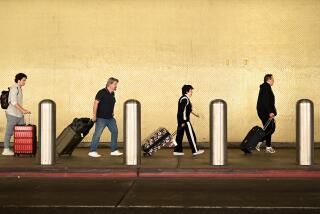Executive Travel : Sleeping Where the Sandman Never Goes
- Share via
Anyone who has ever traveled much knows it’s not just jet lag that robs you of rest. Noisy hotels, unfamiliar food, altered schedules, stress and fatigue can wreak havoc on the best of sleepers.
Yet getting good rest is essential if you’re traveling on business, a time when you need to be able to give your best sales presentations, or stay on top of the trickiest business negotiations.
It doesn’t help that many business travelers start their journeys in a sleep-deprived state. For example, one young manager for Microsoft Corp. in Seattle recently embarked on a two-week tour of the company’s Middle East distributors after having had little or no sleep for four nights, due to pressure-cooker trip preparations.
Although some discomforts are beyond a traveler’s control, there are several steps you can take to help ensure that you get the sleep you need while on the road.
For starters, you should be well rested before your journey begins, advises Dr. Frisca Yan-Go, medical director of the UCLA Sleep Disorder Center. Sleep specialists refer to this habit as “sleep hygiene.”
Most people require 7 or 8 hours of sleep every 24 hours to function adequately. A few need more sleep, and a few need less. Whatever your need is, if it’s not satisfied, then you have a sleep debt.
This debt can be temporarily masked by coffee or other stimulants, but ultimately, it must be paid back. You can catch up by taking a nap within the 24 hours, or by sleeping longer the next night or two. If you don’t correct the deficit your brain will do it for you by putting you to sleep, usually at the worst possible time.
*
This is where the danger comes in. If you don’t allow your body to catch up, your brain will tell it to sleep when you are in a sedentary activity, such as driving or sitting in long meetings.
Sleep-deprived drivers are not good judges of whether they are about to fall asleep, Yan-Go says. This is why, by some estimates, about 30% of highway vehicle accidents are related to driver fatigue and drowsiness, she adds. “Most people are unaware that the sleepy driver is as potentially hazardous as the drunk driver.”
*
When you consider that business travelers often drive unfamiliar rented cars on unfamiliar roads, the risk is magnified.
Sleep, then, is important not just for productivity, but for safety as well. With that in mind, here are some other suggestions for getting restful sleep while traveling. These tips were compiled from suggestions by Yan-Go and from Dr. Sandra Steinback, a clinical psychiatrist for the Southwest Assn. of Sleep Disorders in Dallas, who has worked as a consultant to Dallas-based Hampton Inns and Homewood Suites extended-stay hotels.
* Avoid alcohol on the plane because it can give you a false sense of drowsiness and impede adjustment to a new time zone.
* Try to move gradually into the destination time zone by going to bed a little earlier than usual on the day you arrive, if you’re shortening your day, or later if you are lengthening it.
* If you have a chronic problem with sleeping, see a physician. Don’t take any sleep medication without consulting your physician.
* Try drinking warm milk, which is a natural sleep inducer.
* Don’t drink alcohol within two hours of bedtime. Drinking may initially make you drowsy, but when the effect wears off it can cause “rebound insomnia.”
* Don’t eat a large meal within 4 hours of going to bed. If you have to have a snack, make sure it is a low-fat one (easier to digest). Some travelers swear by bananas, which contain tryptophan, the same natural sleep inducer that is in milk.
* Try to exercise in the morning or afternoon, since exercise in the evening speeds the metabolism and can interfere with getting to sleep.
* Create a sleep-inducing environment by wearing sleep goggles to block out light and earplugs for noise. Make sure you request a quiet room (one that is away from elevators, service doors and the street.)
* Adjust the thermostat so the room is not too warm at night.
* Don’t nap in the evening. Keep afternoon naps short--about an hour or so, so they don’t throw off your sleep cycle.
* Use the bed only for its intended purpose; don’t watch television or work from it. The idea is to minimize its association with anything other than sleep.
* Establish a routine and try to maintain your usual schedule as much as possible.
* Bring a few things from home to make your hotel room more familiar, such as a family picture, or even a favorite pillow.
* Stick to a healthful diet.
* Designate time for winding down from the day to help manage your stress. Take a hot bath, call relatives or friends, read a book, or watch something funny on television to relax you before trying to sleep.
*
In addition, here are some tips from the National Sleep Foundation for staying alert while driving:
* Get adequate sleep before you go.
* Make frequent stops to exercise, take naps or have coffee.
* Drive with someone else and take turns driving.
* Don’t rely on turning up the radio, opening a window or driving faster or slower to keep you alert.
Sleep is one of the most underrated factors that determine whether your business trip is a successful one. It’s worth investing some time in it.
More to Read
Sign up for The Wild
We’ll help you find the best places to hike, bike and run, as well as the perfect silent spots for meditation and yoga.
You may occasionally receive promotional content from the Los Angeles Times.






